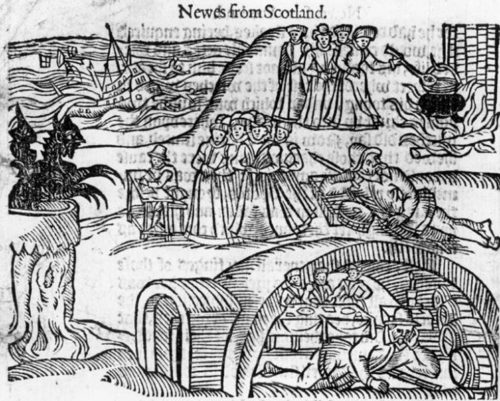SCOTLAND — A recent call for a memorial to the women who were executed in Scotland’s witch trials raises concerns in the UK Pagan community.
Between the 16th and 18th century, nearly 2500 women were executed in Scotland. They were burned at the stake, strangled, or hung, principally as a result of their healing practices or because they were seen as traitors to the Presbyterian cause.
The trials began in North Berwick in 1590 following the Scottish Witchcraft Act in 1563, which was enacted as a direct result of King James VI’s difficulties in bringing his 14 year old bride Anne of Denmark to Scotland by sea. He blamed magical practices for the problems.

His insistence that the issue of witchcraft should be addressed gave rise to a spate of witch hunts, involving both men and women. Many of these trials remain infamous, such as that of Isobel Gowdie, who confessed to meetings with the Devil and to attempted infanticide.
While memorials do exist already, Dr Julian Goodare, a historian at the University of Edinburgh, claims that many of these are “are inappropriate, inaccessible or unknown.” Or indeed, completely historically inaccurate.
“Maggie Walls,” located in Dunning commemorates witches who did not actually exist. At the Witches’ Stone located in Forres, there is a claim that witches were rolled down the hill in spiked barrels. This assertion is not supported by historical evidence.
Calling for a greater degree of historical precision, Dr Goodare told the Sunday Herald, “I would like to see a memorial. I enquired whether the Scottish Government would be interested, but they replied that they have a policy of not paying for memorials so there would have to be a fundraising campaign.”
Others agree. According to reports, Rosie Kane, a feminist former politician who is performing in Seraphina, a play about the Paisley witch trials, agreed, saying: “It is a huge part of Scottish history.” And, professor Lynn Abrams, chair in modern history at Glasgow University, is reported as saying that “the lack of memorials to those executed for witchcraft echoed the “dearth” of visible monuments to Scottish women more generally.”
However, Scottish Pagans and British Pagans of Scottish descent do not have a unanimous view on the issue. However, they are asking, like Dr Goodare, for care to be taken in maintaining historical accuracy.
Jack Dark told TWH, “A memorial to people accused of witchcraft who were imprisoned or killed is long overdue, but despite what are probably good intentions, we should be careful not to let the agendas of some modern Pagans who want to claim them as their own influence this too much.”
Dark continues on to explain, “Regardless of some contemporary testimonies that did offer stories about coven meetings and magic, there’s little to suggest these were anything but what the accused thought the people looking for witches wanted to hear, and given under torture or duress. They aren’t evidence of a Pagan religion that was being persecuted.”
“Almost certainly all of the people that were killed or imprisoned were Christians, who were probably praying to God or the saints throughout their ordeals,” Dark speculates. “For that reason, any permanent monument that named them and called them ‘witches’ rather than specifying that they were falsely accused would be adding insult to injury in the worst possible way.”
Dark believes that Modern self-identified Witches and Pagans who “try to link their contemporary practices with these victims in an attempt to establish a line of legitimacy and heritage” are compounding the issue and “ignoring the main point.”
“Any memorial should serve as a warning about the effects of false accusations, and that when even recently superstition and accusations of ‘witchcraft’ or possession has led to the deaths of those accused, the authority of those who would use superstition as a basis for accusations should always be questioned, and judiciary powers and punishments should always have checks and balances and limits.”
Helen Woodsford-Dean, Scottish Pagan Federation Regional Co-ordinator for Northern Scotland, largely agrees with Dark. She stated, “The women who died weren’t witches, not in any of the sense that most modern neo-Pagan Witches would think of, anyway.”
The world witch meant something different, she noted,”something maligned, evil and to be seriously feared, albeit something largely the product of the imagination.”
Like Dark, Woodsford-Dean speculated, “Most people thought of themselves as Christian – it was all there was – and within that framework, some of them would have practiced folk-magic. But this was a very Christianised folk-magic, mainly performed as protection against the imagined and all-pervading power of the witches.”
Woodsford-Dean noted that PF- Northern Scotland has been trying to “get some sort of minimalist memorial in Orkney for several years now.” She said that it is “intended to get people to reflect on both our past and present societies; how we still scapegoat people at the margins.”
“These cruelties were hatched from socio-economic factors such as poor harvests, a perceived fear of insufficient resources for all: those are still powerful catalysts for persecution today.”
Whilst Scottish pagans support the idea of memorials, there is an argument that what needs also to be taken into consideration is a more nuanced and accurate take on what witchcraft at the time of the persecutions actually meant.
The Wild Hunt is not responsible for links to external content.
To join a conversation on this post:
Visit our The Wild Hunt subreddit! Point your favorite browser to https://www.reddit.com/r/The_Wild_Hunt_News/, then click “JOIN”. Make sure to click the bell, too, to be notified of new articles posted to our subreddit.